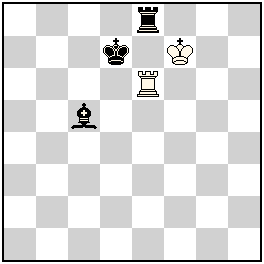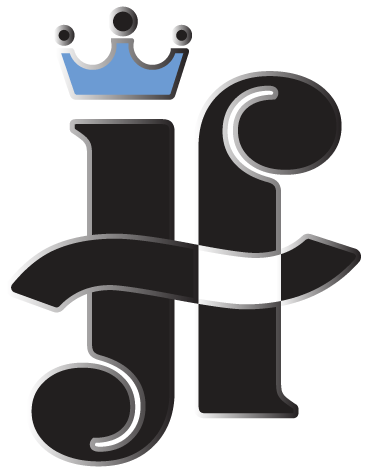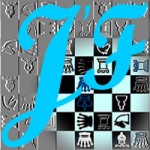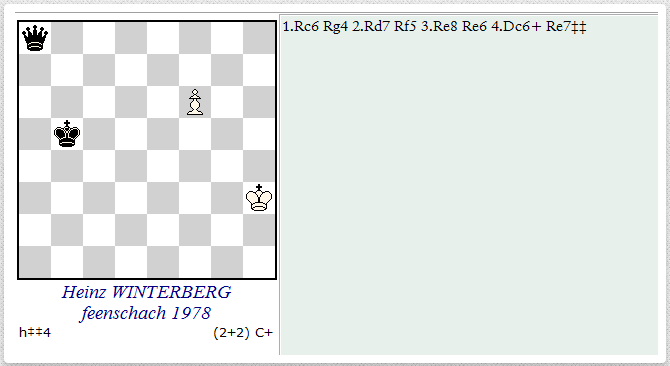| No.410 Peter Harris (South Africa) |
Original Problems, Julia’s Fairies – 2013 (III): September- December →Previous ; →Next ; →List 2013(III) Please send your original fairy problems to: julia@juliasfairies.com |
No.410 by Peter Harris – This problem has an uncommon stipulation h##3 and unusual twin the stipulation is changed to h#3. (JV)
Definitions:
Transmuted Kings: When they are threatened, the Kings move only like the threatening unit(s).
h## – Help-Double mate in n moves: Black begins and help White to create on the n-th move a position where Black and White are mate.
|
No.410 Peter Harris
South Africa
original – 31.10.2013
 h##3 b) h#3 (2 + 3)
Transmuted Kings Solutions: (click to show/hide)
|



So, a definition of Transmuted Kings is given but a precise definition of ## is expected to be self-evident.
Sorry, have added the definition for h##n! Thanks, Nikola! The simple example without fairy conditions (I’ve found in Echecs db of WinChloe) might be THIS one: [/img]
[/img]
[img
Thanks Julia but this definition doesn’t explain the legality of 3…Re6-d6##.
In case of ==, all moves are legal and although the strict rules could only say that the side on the move has no legal moves and is not checked, we could speculate that the other side is also stalemated (this is quite an artificial/absurd idea because in any position, the side whis is not on the move automatically can’t play any legal move).
Here, the rules which allow 3…Rd6## should be defined. I wonder what would be a self-consistant definition.
This ## stipulation is really strange and I dont think I will ever understand how white can play the illegal move 4.Re7 (in the example given). Is it not selfcheck also?
I believe it IS selfcheck! And selfmate as well… Same as you I find this stipulation strange. Sorry, I can’t give you any comments about the general rules here. Maybe someone also can?
Juraj Lörinc has done it on his website http://www.jurajlorinc.com/chess/explanat.htm#beidmatt
“Q: I noticed strange symbol ## in a stipulation of a problem. What does it mean?
A: This is the aim of a problem, similar to well known mate (symbol #) or stalemate (symbol =). ## is used in the same sense that solving program Popeye has for it. It is beidmatt and its definition may be given as follows: it is the position in which both kings are mated. The last move reaching this position may be played even if it leaves own king under check or it is selfcheck, but the king of the side playing the move reaching beidmatt mustn’t be mated yet before this move is played. It is different from gegenmatt that is symbolized in Popeye by ##! and that has no restriction on position immediately preceeding last move of solution. Gegenmatt is usually called doublemate in English, beidmatt having no counterpart. “
Juraj;s explanation is understandable. After all, without going through self-check method, both kings cannot be mated simultaneously.
But the idea of “Mate” itself is drawn from the “game”. In the game, pinned pieces also check. The logic for that is once the opponent king is captured the game ends, the attack to your own king can therefore be ignored. Here when the King gives check … this logic of “mate” does not work. So…. we will just accept the definition for “##”.
Yes, “beidmatt” looks well defined although the last move violates the most distinctive fundemental chess rule. So in the essence, it does not belong to chess-family, but we can accept that most of the play and the final concept of a mate resemble the chess rules.
The difference between “beidmatt” and “gegenmatt” is partially shown by Mr.Harris in the comment to his No.411. But what would be a precise definition of “gegenmatt”?
In the example found by Julia, h##4 by H.Winterberg, after 3.Ke8 Ke6 4.Qc6+, wK is checked but not mated and “beidmatt” 4…Ke7## is possible because now bK is mated (not “only checked”), so 5.Qc6-d7? is not a possible “beidmatt” move by Black. In case of “gegenmatt”, 4…Ke7 is not possible according to Popeye.
It looks clear because now although both Kings would be mated after 4…Ke7, Black would still be able to play 5.Dc6-d7##! with a “new” “gegenmatt”. Since after the first (apparent) “gegenmatt” 4…Ke7? Black still can play a move, 4…Ke7 perhaps might be treated as impossible, but I can’t say exactly why. It is particularly confusing regarding Popeye’s answer to the following position stipulated as ##!1: wKe1,wQc3,bKe2,bPf3. Popeye says:”the side to play can capture the king”! If 1.Qc3-d2##! is not possible in that position, then why 4…Ke7##! is not possible in the previously mentioned position?
Strange
Beidmatt is one of the 3-4 variants of stipulations which basically require both kings to be in checkmate(“doppelmatt”).. similar to doublestalemate(“doppelpatt”)..
there was a long article in feenschach 1981 on these types by Jorg Kuhlmann..
I dabbled with these for some time.. in madrasi as also with the “vielvater” position..
If i remember correctly, in hilfsbeidmatt, black checks on his last move, white can block or otherwise avoid this check, instead he chooses to checkmate black, while at the same time converting black’s check to a proper checkmate of his own king.. so the moves are entirely legal.. except for white’s last move..
was that clear..? :-).. nice heady stuff..
The Fairy Encyclopedia at the website of Die Schwalbe makes the same distinction between Beidmatt and Gegenmatt as does Popeye: in Beidmatt (which would be “bothmate” in English), a player that is NOT already mated may make a move that puts both kings in a mate position; in Gegenmatt (which would be “countermate” in English), a player that IS mated may make a move that mates the other king while still leaving hos own king in a mate.
So the reason 4…Ke7? in the Winterberg position is not legal in Gegenmatt according to Popeye is that White is not mated before the move.
And the reason Popeye says “the side to move can capture the king” in the reflected position Nikola mentions is most likely that both K’s are already mated! It is not possible to play a Beidmatt or Gegenmatt move when there already is such a double mate on the board; the play stops there.
This is all fairly confusing and counter-intuitive, so I can well understand that the various double-mate forms were never a big hit.
Peter’s two problems (410-411) are quite nice though!
Thanks Kjell, I became aware of these things too late, after posting (:
So, it should perhaps be defined that the first appearance of Gegenmatt position stops the play. Otherwise the following perhaps could be speculated:
wKh8,wRh7,wRf6,bKf8,bRe8 h##!Ultimate in 2 moves
1.Kg8##!1, now wK is mated and White can play 1…Rf7##!, now bK is mated and it can procede 2.Rf8##! Rg7##!Ultimate
Now Black is in a Zugzwang, having no “Gegenmatt moves” and the “Ultimate Gegenmatt” is achieved.
There are duals, if there’s any sense in it, in the first place.
:):):)
My head is spinning … this (Nikola’s latest) looks like one of those brainteasers Ronald Turnbull is fond of producing. Or like one of those positions in Checkless Chess where a checking move is mate (and therefore legal) if the only counter-move is an illegal check and not a legal mate, which depends on whether the only counter-move to that is an illegal check or a legal mate, which depends … etc, sometimes even in an endless loop.
So I don’t expect h##! Ultimate to be a great hit either, but you are welcome to prove me wrong! 🙂
hmm.. the trio of double mate types was: doppelmatt, beidmatt and gegenmatt.. there’s a subtle difference between doppelmatt and beidmatt.. need to dig out that Kuhlmann article..
Ok.. Got the article.. Here’s a scanned copy of it.. https://db.tt/10K9Uv0A .. for whoever’s interested..